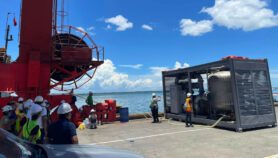Send to a friend
The details you provide on this page will not be used to send unsolicited email, and will not be sold to a 3rd party. See privacy policy.
[CAPE TOWN] South Africa will host a new office to spearhead a ten-year plan of the International Astronomical Union (IAU) to use astronomy to stimulate education and development worldwide.
The IAU launched its Office for Astronomy Development at the South African Astronomical Observatory in Cape Town last month (16 April) as part of its ‘Astronomy for the Developing World’ plan.
"Our quest is to improve people’s lives in Africa and abroad," said Kevin Govender, the office’s director. "We seek to develop ourselves and our society, and at the heart of this development is education.
"Astronomy stimulates curiosity and a desire to learn," he told SciDev.Net, giving it the potential to create a scientific, problem-solving culture that can empower people.
According to Robert Williams, IAU president, talented professional and amateur astronomers, engineers and teachers from around the world can be mobilised to benefit developing countries.
The launch is the latest in a series of astronomy initiatives in South Africa. Two days earlier, Cape Town was home to the launch of the first pan-African astronomy network, which aims to "facilitate the use of astronomy in addressing the challenges faced by Africa", among other things. And South Africa is in fierce competition with Australia to host the Square Kilometre Array (SKA), a giant radio telescope — a decision is expected early next year.
But there have been criticisms of South Africa’s astronomy investments. For example, a 2010 editorial in Nature criticised the country’s focus on ‘big science’ projects, such as the SKA, rather than areas where it has expertise and natural advantages, for example, palaeontology, mining, zoology and clinical medicine.
The country also failed to meet its target of spending one per cent of GDP on research and development last year, raising further questions about its huge investments in astronomy.
Govender defended investment in astronomy, saying: "In terms of the scientific advantages, astronomy is one of the biggest South Africa has".
"It seems to me that the target of one per cent would have been missed by an even greater margin without the SKA investments," he added, which implies there should be even more spending on astronomy, not less.
South Africa’s science minister, Naledi Pandor, said at the launch: "We chose to invest heavily in science and astronomy, because of its role in development, not only within South Africa, but all across Africa. Big astronomy projects [such as] SKA entail major capacity development programmes in order to train the next generation of engineers and astronomers from all over Africa."
Link to ‘Astronomy for the Developing World’ strategic plan ![]() [1.76MB]
[1.76MB]













